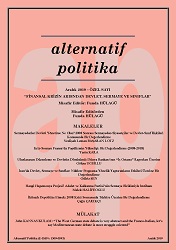İKTİSADI DEPOLİTİZE ETMEK: 2008 KRİZİ SONRASINDA TÜRKİYE ÜZERİNE BİR DEĞERLENDİRME
DEPOLITICIZATION OF THE ECONOMIC MANAGEMENT: THE CASE OF TURKEY IN THE POST-2008 ERA
Author(s): Çağrı ÇarikçiSubject(s): National Economy, Governance, Economic policy, Political economy, Economic development
Published by: Rasim Özgür DÖNMEZ
Keywords: Crisis; Capitalism; Political Economy; Depoliticization; Turkey;
Summary/Abstract: This paper focuses on the reactions given by the state in Turkey to the financial crisis of 2008 in terms of economic policies. First, the concept of depoliticization is analyzed with a theoretical perspective ensuing from the Marxist state theory. Afterwards, the tendencies of transformation in the economy of Turkey starting from the 1980s are briefly explained and the policy decisions and the contradictions of this process are discussed from the perspective of depoliticization. One of the dominant themes in the 1990s when neoliberalism gained power in global scale revolved around the discourse of “depoliticizing the economy” and several policies were developed in line with this discourse. These policies have returned the management of the economy to the technocrats and independent auditing organizations working in fundamental economic sectors; they have taken the monetary policy out of the government’s area of authority and responsibility as part of the principle of the independence of the Central Bank. With these policies, the capitalist state has tried to redetermine the relation between the economic and the political. The strategy of depoliticization, indeed, has been an important tool that the state has been using while managing the financial processes in Turkey especially since the 2001 crisis. Since the 2008 crisis, this strategy has been implemented to strengthen the centralization tendencies that have been already dominant in the management of Turkish economy for the last four decades.
Journal: Alternatif Politika
- Issue Year: 11/2019
- Issue No: Special
- Page Range: 149-176
- Page Count: 28
- Language: Turkish

